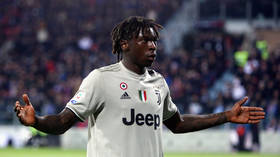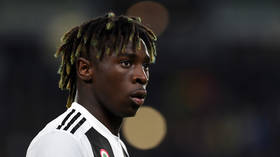Go f*ck yourselves: Moussa Marega’s defiance should be celebrated as watershed in ugly fight against racism
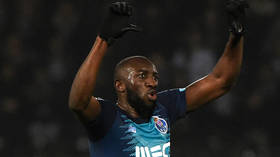
The images of Moussa Marega, standing with a finger extended on each hand to football thugs who abused him with vile monkey chants, should be celebrated as a defiant stance in the face of racism in football.
It took him a handful of attempts. Moussa Marega had to force his way past teammates to make his way off the pitch while monkey whistles and chants polluted the air at Estádio D. Afonso Henriques Stadium. But eventually he made his way off the pitch.
Minutes earlier he had put Porto 2-1 up on the hour mark in their Portuguese Primeira Liga clash away to Vitoria Guimaraes on Sunday.
Marega abandona o relvado no D. Afonso Henriques contra a vontade de colegas e equipa técnica#LigaNOS#VSCFCP🎥⏱ https://t.co/q8tCRvjMxSpic.twitter.com/vRd7LfTtme
— VSPORTS (@vsports_pt) February 16, 2020
To mark the goal, the powerfully built Mali international wheeled away and repeatedly pointed with both pride and with irony at his skin. The message was clear. The intended recipients were a pocket of home fans who rained down whistles and monkey chants whenever he had touched the ball.
However, his dignified retaliation only precipitated more intense abuse for the player who had spent the 2016-17 season on loan at the club in the north of the Iberian nation and from there, events took a painfully predictable path of rough justice.
The referee Luis Godinho inexplicably took exception to Marega’s celebration, and booked the player. Feeling understandably violated and now vilified, and with the chants now drowning out any thoughts of a rational response, an incensed Marega began to leave the field, thrusting both thumbs down at the crowd.
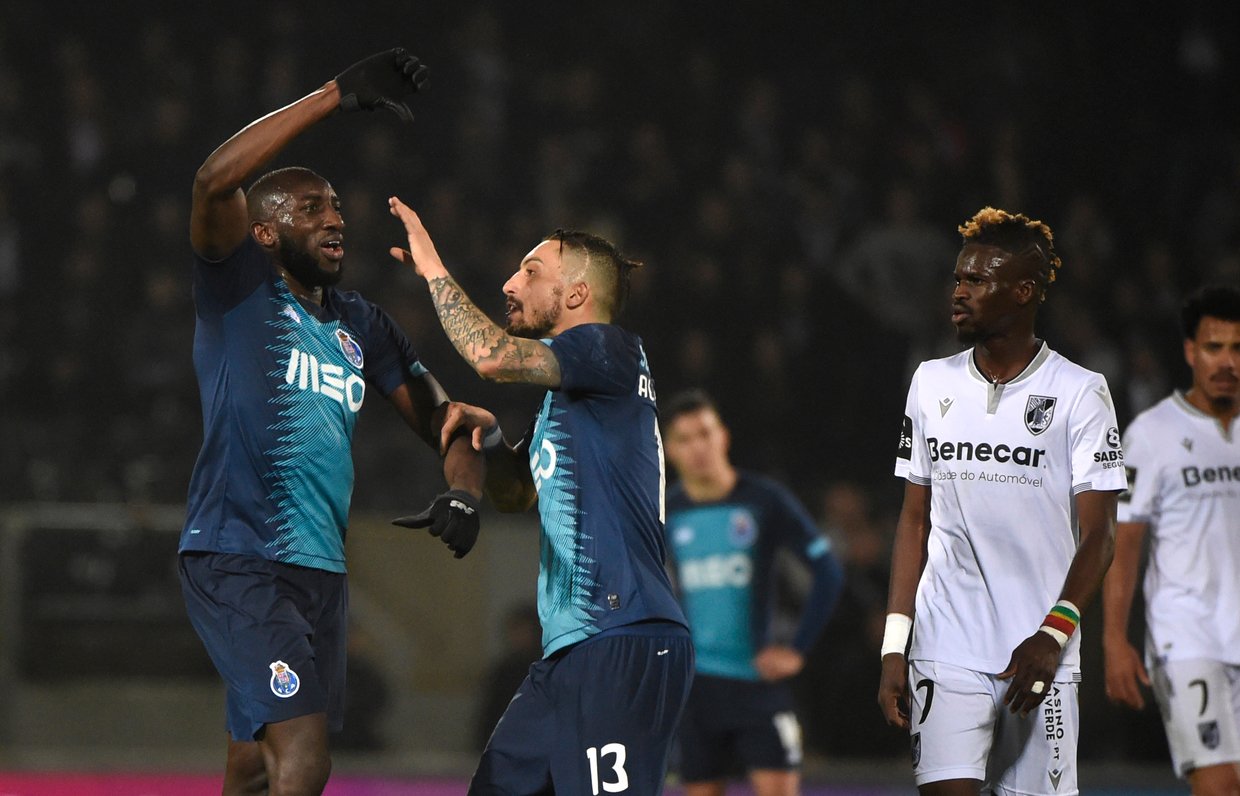
Then came another disappointing downturn. His teammates pushed and pulled, protested and pleaded with Marega to stay, at times looking almost to admonish the broad-shouldered striker for making his stand. Only his manager, Sergio Conceicao, could be seen directing any resistance to the vitriol from the stands.
Eventually becoming free, and particularly from animated Brazilian midfielder Otavio, Marega approached the tunnel. There he stopped. He stood in front of his tormentors and unleashed a double middle finger salute at the thugs that had infested the crowd in a final act of defiance.
Marega’s message has been perceived as excessive, obscene, but it certainly wasn’t petulant. His actions were a brave stand in the face of repugnant abuse, and that must not only be fiercely respected, but encouraged.
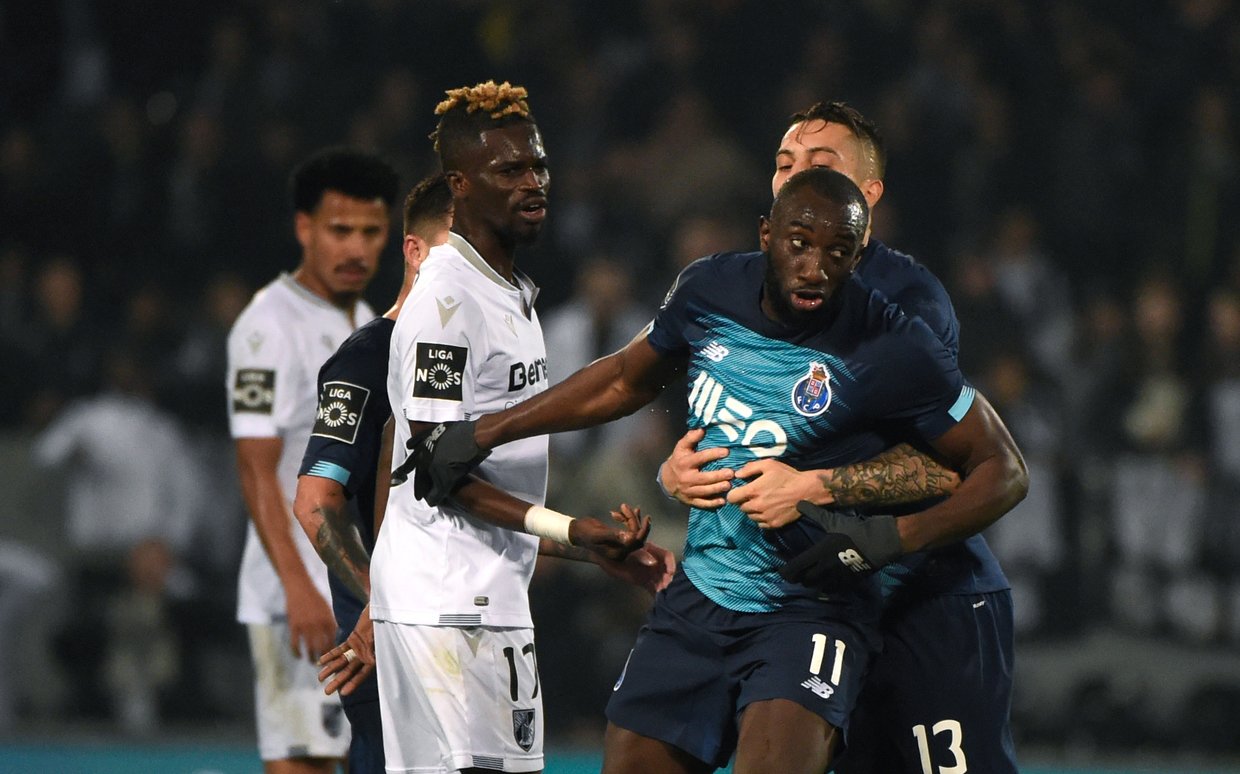
They were ever more important against the backdrop of abject failures by football authorities to clear the lingering stench of racism from its fan culture. Marega’s nerve to leave the field should serve as a watershed moment in attitudes towards victims of racial abuse.
It is a marker of how far players have been shunted to the edge of reason by being forced to lie down and accept repeated, targeted maltreatment by a sport that has become casually indifferent to racism. They have been repeatedly disparaged and punished for any retaliation perceived to be overzealous.
There are countless examples of even silent, dignified protests against racism resulting in the same lopsided punishments meted out where abused players have been denigrated and deplorable behavior is left to go unnoticed.
In 2019, former Juventus star Moise Kean, like Marega, admirably celebrated in front of Cagliari fans - who had subjected him to monkey chants throughout the match - after scoring a late clincher.
The aftermath? Cagliari faced zero punishment by the Italian Football Federation (FIGC), who were branded ‘pathetic’ and ‘embarrassing’ for their inaction. Though Kean’s captain Giorgio Chiellini said the blame for being abused lay 50 percent with the then-19-year-old.
Later that year, Cagliari fans were again mired in a racism scandal when Inter’s Romelu Lukaku was greeted by a chorus of monkey chants as he netted a penalty on 72 minutes during a Serie A game away to the Sardinian club.
Lukaku was later instructed by his own fans to take the monkey chants as "a sign of respect,” explaining such gross mistreatment is rooted in the fact “they are afraid of you for the goals you might score against their teams and not because they hate you or they are racist.”
In the face of such reasoning, parody seems redundant.
In November, Shakhtar Donetsk striker Taison took a slightly more confrontational stance and decided to react to overtly racist abuse from rival Dynamo Kiev fans by punting the ball into the crowd. His penalty? A straight red card and a one-match ban.
This is really tough to watch. The blatant disregard for protocol is unacceptable, and players should be united and walk off together in their condemnation of racism, instead of this. We stand with Moussa Marega. #KickItOuthttps://t.co/CWj1izeCfw
— Kick It Out (@kickitout) February 17, 2020
What message does that send out to a player suffering abuse, who is tempted to take justice into his own hands, or in Marega's case, his fingers?
There can be an argument made that retaliation plays into the hands of the racists, that a strong, outwardly stoic response can deprive them of the oxygen they seek from anger and exasperation.
But a wider point is that too often victims of racial abuse on the pitch, instead of finding any shred of justice, are themselves harshly policed and punished and, in the absence of solidarity and support, find themselves being lectured on how to react by those who have never been in a similar position.
It would be contradictory to imply all players should react with the same rawness and ire as Marega. Rather, whichever way they feel is fully effective, that fully expresses their frustration, their disgust, their betrayal at humiliation, they should never be subjected to judgment and, within reason, guilt should never rest on their shoulders.
"Somos uma família"Dragões Juntos#FCPorto#DragõesJuntospic.twitter.com/PlKevRFpmz
— FC Porto (@FCPorto) February 16, 2020
For wading through the fierce protests of his own teammates and taking the crowd to task, Marega should be celebrated for his non-compliance in the face of racism not for his courage or bravery, not because it’s right, but for the sheer fact he reacted not in the way all those around him wanted.
His reaction, be it whatever, was his.
Without proper support and without any plan to prevent similar repeated incidents in future, the least any observer can offer is respect for that alone. Then, perhaps others in positions of power will follow suit and show the same boldness to protect those players against a repeat. Just maybe.
By Danny Armstrong


